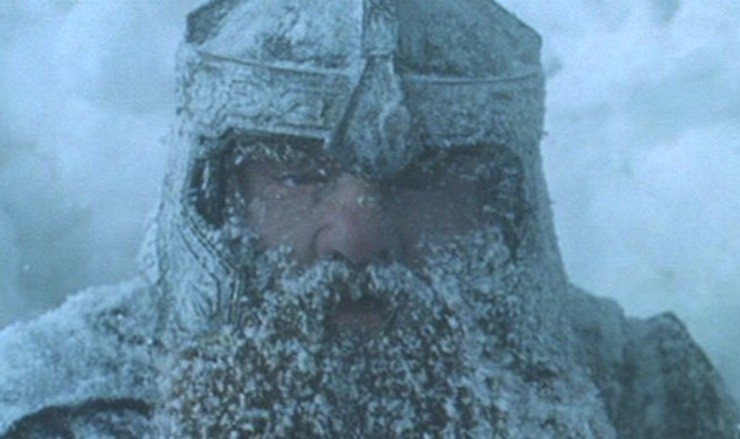After yesterday’s “bomb cyclone” ravaged the east coast, many of you may be taking a welcomed snow day, settling down beneath the blankets with a mug of something hot and a good book or three. Some prefer to escape in fantasies of deserts and warmth, but we’re doubling down this season with a list of wintry reads featuring frozen tundras, majestic ice castles, and at least one magical wardrobe…
Bundle up and read on, and please let us know if we missed your favorites in the comments!
The Snow Queen—Joan D. Vinge
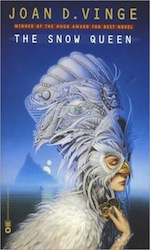 Joan Vinge’s novel takes us to Tiamat, a planet whose suns orbit a black hole, and whose inhabitants have split themselves into two rigid ways of life. The Winters believe in tech, and travel off-world when they can. The Summers believe in social castes and tradition.
Joan Vinge’s novel takes us to Tiamat, a planet whose suns orbit a black hole, and whose inhabitants have split themselves into two rigid ways of life. The Winters believe in tech, and travel off-world when they can. The Summers believe in social castes and tradition.
Every 150 years, the orbit of the planet causes drastic ecological shifts which could cause chaos. To prevent this, the planet is ruled by two queens: a Snow Queen to represent the Winters, and a Summer Queen to represent the opposition in summer. The Queens live for the entire 150-year span thanks to the “water of life” taken from sentient sea creatures, and they are then ritually executed at the end of their rule. But Arienrhod, the latest Snow Queen, has other plans. The Snow Queen won the Hugo Award for Best Novel in 1981.
The Five Daughters of the Moon—Leena Likitalo
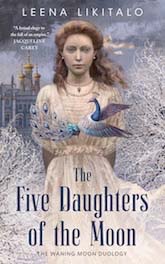
Imagine a snowglobe, inside which a darling little train chugs along through snowy mountains reminiscent of Russia. Then give the snowglobe a fierce shake, and look inside to see what’s really going on: That train holds the Five Daughters of the Moon, fleeing for their lives as the Crescent Empire threatens to crumble in the face of a revolution led by Gagargi Prataslav and his Great Thinking Machine, devouring human souls in its quest to visualize the future.
Though Leena Likitalo’s Waning Moon duology begins readers’ journey in an idealized wintry wonderland, the furs and the pearls, all of the supposed finery, are stripped away, until it becomes a story about survival and legacy. Once you’re done shivering from the first installment, pick up The Sisters of the Crescent Empress.
The Lion, The Witch and the Wardrobe—C.S. Lewis
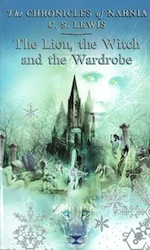 When the Pevensie children first step through the Wardrobe and into Narnia, they discover a land where it’s always winter and never Christmas, thanks to the powers of The White Witch, Jadis. She’s held control over Narnia for a hundred years, but the arrival of the sons of Adam and the daughters of Eve spells her doom. Their presence in Narnia is enough to weaken her powers, beginning with the return of Aslan, and resulting in a strange visit from Father Christmas, who arms each of the children for the final battle.
When the Pevensie children first step through the Wardrobe and into Narnia, they discover a land where it’s always winter and never Christmas, thanks to the powers of The White Witch, Jadis. She’s held control over Narnia for a hundred years, but the arrival of the sons of Adam and the daughters of Eve spells her doom. Their presence in Narnia is enough to weaken her powers, beginning with the return of Aslan, and resulting in a strange visit from Father Christmas, who arms each of the children for the final battle.
It’s a pretty great winter read, but the best bit is that at the end of the story (um, spoiler alert) as winter melts away into a glorious spring, which is a resurrection tale we can all agree on.
Winter Tide—Ruthanna Emrys
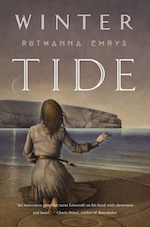
Ever since she escaped the internment camps in which the U.S. government imprisoned the citizens of Innsmouth, far from their Deep One ancestors, Aphra Marsh has performed the Winter Tide in any way she can: far from the chilly New England town she once called home, relying on sigils and half-remembered ritual to part the fog in San Francisco for the hope of communing with the universe and finding answers, decades after she was taken from Innsmouth.
Ruthanny Emrys’ Lovecraftian novel isn’t about winter in the archetypal sense of snow days and fighting off the cold with coziness; rather, it concerns winter as a time of transition, of transformation (as Aphra’s people do, moving from the land to the sea before their lives were interrupted); and the most chilling of metaphors, the Cold War that threatens to turn hot if Aphra doesn’t help FBI agent Ron Spector figure out what secrets Communist spies might have stolen from Miskatonic University.
Nights of Villjamur—Mark Charan Newton
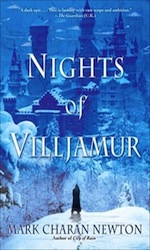 Nights of Villjamur tells several stories—one of the coming-of-age of a princess, another of a political murder mystery. But these are set against a larger story: an ice age is crashing down upon Villjamur, and refugees driven ahead of the freeze are gathered, near riot, at the city gates. Can the city open and offer them shelter? The new Queen will need to decide how best to help her people, and protect them from the long winter that is coming to them.
Nights of Villjamur tells several stories—one of the coming-of-age of a princess, another of a political murder mystery. But these are set against a larger story: an ice age is crashing down upon Villjamur, and refugees driven ahead of the freeze are gathered, near riot, at the city gates. Can the city open and offer them shelter? The new Queen will need to decide how best to help her people, and protect them from the long winter that is coming to them.
The Riddle—Allison Croggon
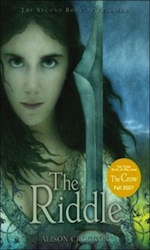 The second book in the Pellinor Series, The Riddle follows young Bard Maerad as she goes on a quest to solve the Riddle of the Treesong—the only thing that can bring peace to a kingdom divided by Dark and Light.
The second book in the Pellinor Series, The Riddle follows young Bard Maerad as she goes on a quest to solve the Riddle of the Treesong—the only thing that can bring peace to a kingdom divided by Dark and Light.
Maerad, a former slave, is only beginning her magical training, and at least on the surface is no match for the journey expected of her. She is trapped in the frozen realm of the Winterking, and must use all of her wits and new magic to survive. Croggon takes her time, and gives the setting an icy reality that’s hard to shake off after you’ve finished the book.
Cold Counsel—Chris Sharp
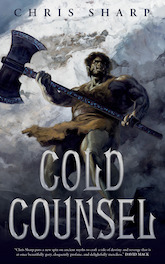
Slud the Unclean is born at the heart of the longest winter storm that his mountain has seen—the winds and snow not subsiding until a month after his birth, during which time various members of the Blood Claw Clan as well as its enemies have been struck down by mysterious bad fortune. Is it any surprise, then, that his father, chief Nine-Claws (whose name changes thanks to Slud’s teething), is inspired, after weeks of being cooped up in the mountain, to guide his clan to conquer new lands?
Unfortunately, that same bad fortune also befalls Slud’s family, wiping out all of the trolls at the hand of the elves, except for Slud and his Aunt Agnes. Hidden away from the ravaging elves, Slud is molded into an instrument of revenge—so that when he reaches adulthood, he will truly fulfill his name, as the Bringer of Troubles.
Winter of the World Trilogy—Michael Scott Rohan
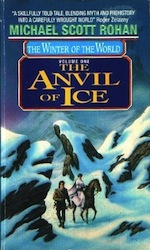 A modern narrator translates the Winter Chronicles, and tells us the tale of a mythic ice age. As the Great Ice threatens civilization, a tiny act of kindness—or is it cruelty—kicks off an epic journey. The leader of the cannibalistic Ekwesh, Mylio, spares the life of a young boy, but then makes him his apprentice. As the boy masters his new skills and forges a powerful sword, Mylio takes it up and uses it for evil. The boy, now calling himself Elof, flees, running from both Mylio and the Great Ice. But can such a young man defeat his old Master? Rohan creates a bleak setting to create maximum chilliness for Anvil of Ice, the first entry in his Winter of the World trilogy.
A modern narrator translates the Winter Chronicles, and tells us the tale of a mythic ice age. As the Great Ice threatens civilization, a tiny act of kindness—or is it cruelty—kicks off an epic journey. The leader of the cannibalistic Ekwesh, Mylio, spares the life of a young boy, but then makes him his apprentice. As the boy masters his new skills and forges a powerful sword, Mylio takes it up and uses it for evil. The boy, now calling himself Elof, flees, running from both Mylio and the Great Ice. But can such a young man defeat his old Master? Rohan creates a bleak setting to create maximum chilliness for Anvil of Ice, the first entry in his Winter of the World trilogy.
Ancillary Justice—Ann Leckie
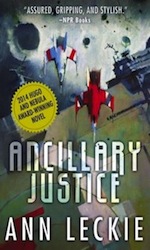 Ancillary Justice spends about the first quarter of the book on an ice planet, as our narrator Breq has to navigate an unfamiliar society that has simply gotten used to surviving at sub-zero temperatures.
Ancillary Justice spends about the first quarter of the book on an ice planet, as our narrator Breq has to navigate an unfamiliar society that has simply gotten used to surviving at sub-zero temperatures.
The third or fourth time a character has to thaw frozen bread in water to make it soft enough to eat, you’ll be asking yourself “WHY DO THEY STILL LIVE THERE” but when the story flashes back to the incredibly muggy swampland of Shis’urna, we actually start to miss the cold. We’re so changeable.
Shiver—Maggie Stiefvater
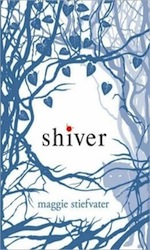 The first book in the Wolves of Mercy Falls series, Shiver tells the story of a girl and her werewolf. Grace, a human girl, finds herself drawn to a pack of wolves without fully understanding why. She knows she should fear them, but they seem to be… protecting her?
The first book in the Wolves of Mercy Falls series, Shiver tells the story of a girl and her werewolf. Grace, a human girl, finds herself drawn to a pack of wolves without fully understanding why. She knows she should fear them, but they seem to be… protecting her?
One of them, Sam, lives a dual life: in the winter he is a wolf, running with his pack and loving the cold. In summer he is granted a few sweet months of humanity. His other nature looms over him though—if he allows the cold to take him again, will he lose his humanity, and with it, Grace?
Winter’s Tale—Mark Helprin
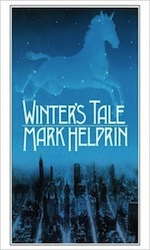 While the 2014 movie adaptation didn’t work so well, Mark Helprin’s novel is much-beloved, and a great choice for a winter read. We travel to a slightly-alternate Belle Epoque New York bombarded by blizzards. One freezing night an Irish burglar, Peter Lake, breaks into a mansion, only to find a beautiful young girl inside. She’s suffering from consumption, and the cold bears down on her like death itself. The two fall into an epic, fairy tale love, and Lake is inspired to do whatever he can to stop time and save the girl’s life.
While the 2014 movie adaptation didn’t work so well, Mark Helprin’s novel is much-beloved, and a great choice for a winter read. We travel to a slightly-alternate Belle Epoque New York bombarded by blizzards. One freezing night an Irish burglar, Peter Lake, breaks into a mansion, only to find a beautiful young girl inside. She’s suffering from consumption, and the cold bears down on her like death itself. The two fall into an epic, fairy tale love, and Lake is inspired to do whatever he can to stop time and save the girl’s life.
The Winter of the World—Poul Anderson
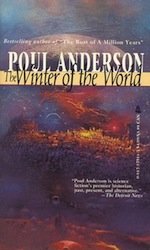 In Poul Anderson’s The Winter of the World, we begin thousands of years in humanity’s future, after an Ice Age has enveloped the Earth. Only a few groups of people have managed to survive, and the book explores the different ways they deal with the harsh environment, and what values carry humanity forward after so much has been lost. The extreme cold is woven into every page of the story…so maybe wait until summer to read this one.
In Poul Anderson’s The Winter of the World, we begin thousands of years in humanity’s future, after an Ice Age has enveloped the Earth. Only a few groups of people have managed to survive, and the book explores the different ways they deal with the harsh environment, and what values carry humanity forward after so much has been lost. The extreme cold is woven into every page of the story…so maybe wait until summer to read this one.
The Terror—Dan Simmons
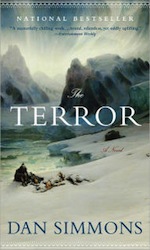 The Terror digs into Captain Sir John Franklin’s lost expedition to the Arctic and adds an element of the uncanny. The crews of the HMS Erebus and HMS Terror are already fighting starvation, scurvy, bitter cold, and the threat of cannibalism after their ships are trapped in ice. But when they venture out across the floes to find food, they themselves become prey for a horrific creature that seems to have sprung from nightmares. As the months go by with no break in the cold, the crew try to eke out a life on the two ships, while the morale fails within, and the monster waits outside…
The Terror digs into Captain Sir John Franklin’s lost expedition to the Arctic and adds an element of the uncanny. The crews of the HMS Erebus and HMS Terror are already fighting starvation, scurvy, bitter cold, and the threat of cannibalism after their ships are trapped in ice. But when they venture out across the floes to find food, they themselves become prey for a horrific creature that seems to have sprung from nightmares. As the months go by with no break in the cold, the crew try to eke out a life on the two ships, while the morale fails within, and the monster waits outside…
Cold Earth—Sarah Moss
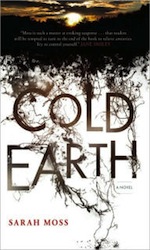 A team of three men and three women (Nina, Ruth, Catriona, Jim, Ben and Yianni) travel to Greenland to excavate an ancient Viking site. They attempt to establish normalcy and routine in their camp, while the rest of the world lives in fear of a pandemic that is threatening the Earth’s population. Each scientist is haunted by the past, but Nina, already worried that she’s the weakest member of the expedition, finds herself haunted by actual ghosts as well, which sets the rest of the team on edge. After the team’s leader makes a disastrous mistake, they realize that they may not live through the looming Greenland winter. They cope with their mounting panic by writing letters home—but will the letters reach their families? Will they survive to see the spring?
A team of three men and three women (Nina, Ruth, Catriona, Jim, Ben and Yianni) travel to Greenland to excavate an ancient Viking site. They attempt to establish normalcy and routine in their camp, while the rest of the world lives in fear of a pandemic that is threatening the Earth’s population. Each scientist is haunted by the past, but Nina, already worried that she’s the weakest member of the expedition, finds herself haunted by actual ghosts as well, which sets the rest of the team on edge. After the team’s leader makes a disastrous mistake, they realize that they may not live through the looming Greenland winter. They cope with their mounting panic by writing letters home—but will the letters reach their families? Will they survive to see the spring?
Ice—Anna Kavan
 Anna Kavan’s post-apocalyptic novel parallels the death throes of a relationship with the disintegration of a world transformed by glacial encroachment. According to the narrator, “the defenseless earth could only lie waiting for its destruction, either by avalanches of ice, or by chain-explosions which would go on and on, eventually transforming it into a nebula, its very substance disintegrated” He is called the warden, and his world is fog and ice. He hunts for a mysterious girl, a girl with skin and hair as white as the walls of ice that have overrun the landscape. Who is she? And why does her image haunt the man? Ice was awarded the Brian Aldiss Science Fiction Book of the Year award in 1967, and is now recognized as a classic of slipstream literature.
Anna Kavan’s post-apocalyptic novel parallels the death throes of a relationship with the disintegration of a world transformed by glacial encroachment. According to the narrator, “the defenseless earth could only lie waiting for its destruction, either by avalanches of ice, or by chain-explosions which would go on and on, eventually transforming it into a nebula, its very substance disintegrated” He is called the warden, and his world is fog and ice. He hunts for a mysterious girl, a girl with skin and hair as white as the walls of ice that have overrun the landscape. Who is she? And why does her image haunt the man? Ice was awarded the Brian Aldiss Science Fiction Book of the Year award in 1967, and is now recognized as a classic of slipstream literature.
At the Mountains of Madness—H. P. Lovecraft
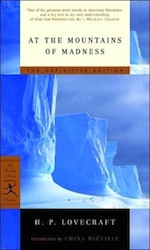 Lovecraft takes us on a happy jaunt to Antarctica in his novella, At The Mountains of Madness. While on expedition, geologist and Miskatonic University professor William Dyer investigates the death of his colleagues, finding the remains of a dissection experiment and a weird city made of cubes and cones.
Lovecraft takes us on a happy jaunt to Antarctica in his novella, At The Mountains of Madness. While on expedition, geologist and Miskatonic University professor William Dyer investigates the death of his colleagues, finding the remains of a dissection experiment and a weird city made of cubes and cones.
He drags a poor, doomed, and probably unpaid grad student into the city, which includes a series of helpful hieroglyphs that tell the story of The Elder Things’ war with the Star-Spawn of Cthulhu. As they’re reading the story, the explorers realize that They Are Not Alone and scamper, but not before the poor doomed grad student’s frail human mind is shattered by the ultimate truth of the Elder Gods. Plus, since they’re in Antarctica, they’re very very cold during all of this.
Cloud’s Rider—C.J. Cherryh
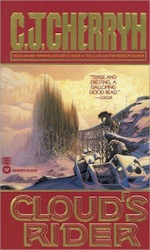 This novel, part of Cherryh’s Finisterre Universe, takes us to an icy clime! The lost colonists from Rider at the Gate are living in walled cities, protected by creatures called nighthorses, who shield them from the maddening telepathic onslaught of the native population. One brutal winter night the colonists face a deadly attack. Their only hope is to follow Danny Fisher and his nighthorse, Cloud, high into the frozen mountains. But once they find sanctuary, they may face an even deadlier monster…
This novel, part of Cherryh’s Finisterre Universe, takes us to an icy clime! The lost colonists from Rider at the Gate are living in walled cities, protected by creatures called nighthorses, who shield them from the maddening telepathic onslaught of the native population. One brutal winter night the colonists face a deadly attack. Their only hope is to follow Danny Fisher and his nighthorse, Cloud, high into the frozen mountains. But once they find sanctuary, they may face an even deadlier monster…
The Brief History of the Dead—Kevin Brockmeier
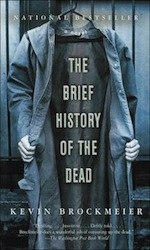 To be fair, only half of The Brief History of the Dead takes place in the cold. Laura Byrd is trapped in an Antarctic research station, and like so many of the books on this list, must set out across the unforgiving ice when low supplies and power failures threaten her life.
To be fair, only half of The Brief History of the Dead takes place in the cold. Laura Byrd is trapped in an Antarctic research station, and like so many of the books on this list, must set out across the unforgiving ice when low supplies and power failures threaten her life.
And now for the cold part: the other half of the book takes place in the City of the Dead. The City functions pretty well, considering, but the dead disappear as they’re forgotten by their survivors, and lately the City itself seems to be shrinking. These two stories unfold in alternating chapters as the Dead try to learn what’s going on, and Laura fights for life in the blistering cold.
The Left Hand of Darkness—Ursula K. Le Guin
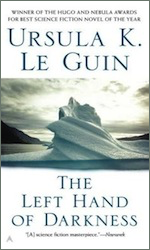 The planet of Gethen is also known as Winter, which should give you some idea. Genly Ai is a Terran, and therefore used to a more varied climate, so we get many pages describing not just the culture shock of being in a non-gendered society, but also just how terribly, terribly cold it is.
The planet of Gethen is also known as Winter, which should give you some idea. Genly Ai is a Terran, and therefore used to a more varied climate, so we get many pages describing not just the culture shock of being in a non-gendered society, but also just how terribly, terribly cold it is.
This really takes off after Genly leaves the relative safety of Karhide to travel to the neighboring kingdom of Orgoreyn, because if you thought the cold was oppressive before, wait until you’re travelling over an ice sheet! And if you thought that was bad… well, we don’t want to spoil anything, just be warned that things can always get worse, and colder, but that the journey is worth it.
This post has been updated since its original publication in January 2015.










